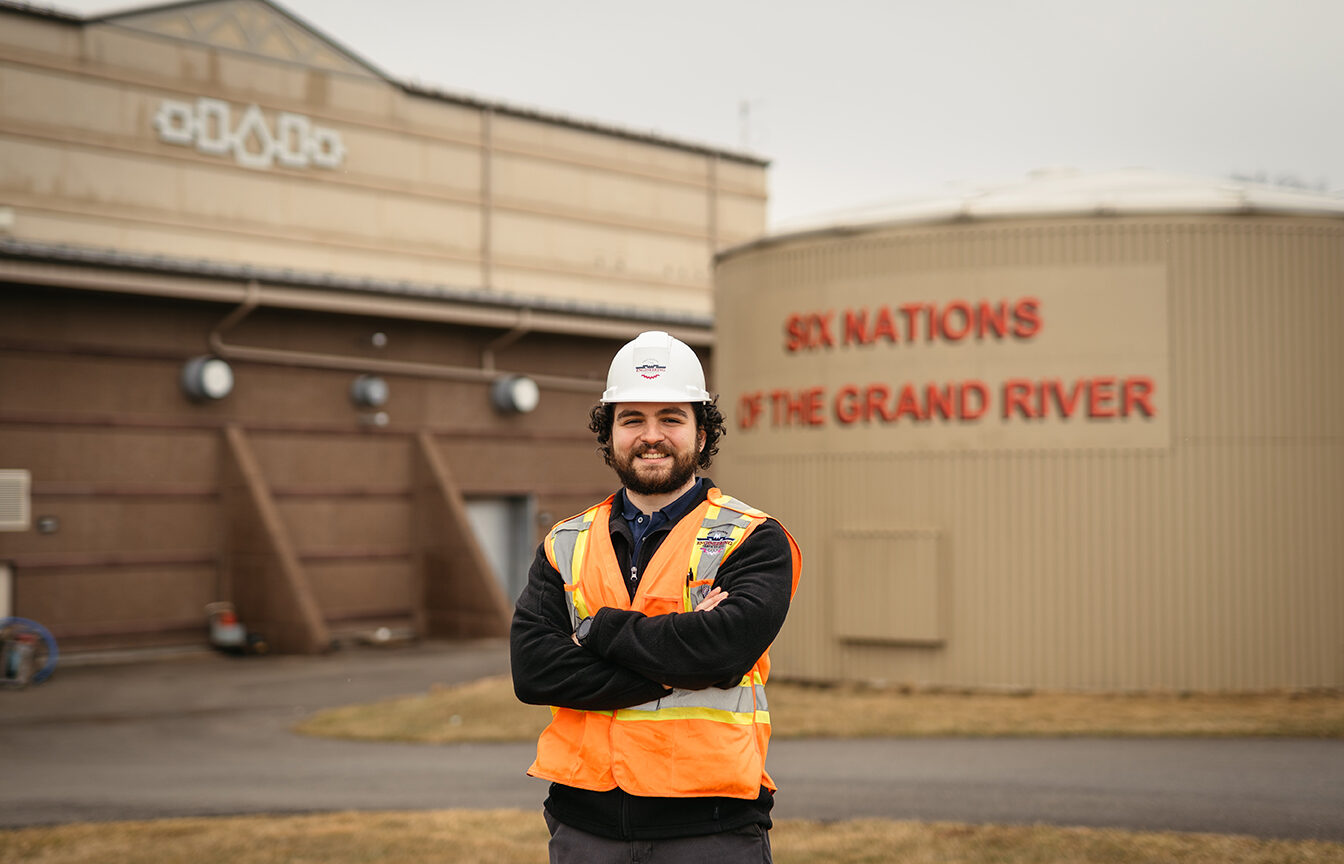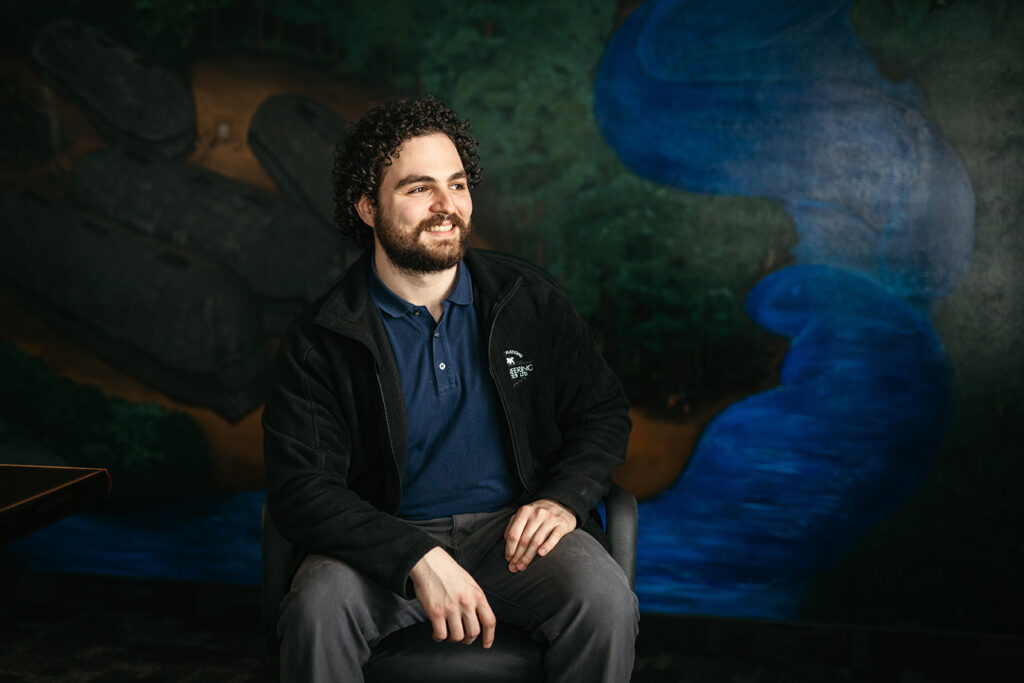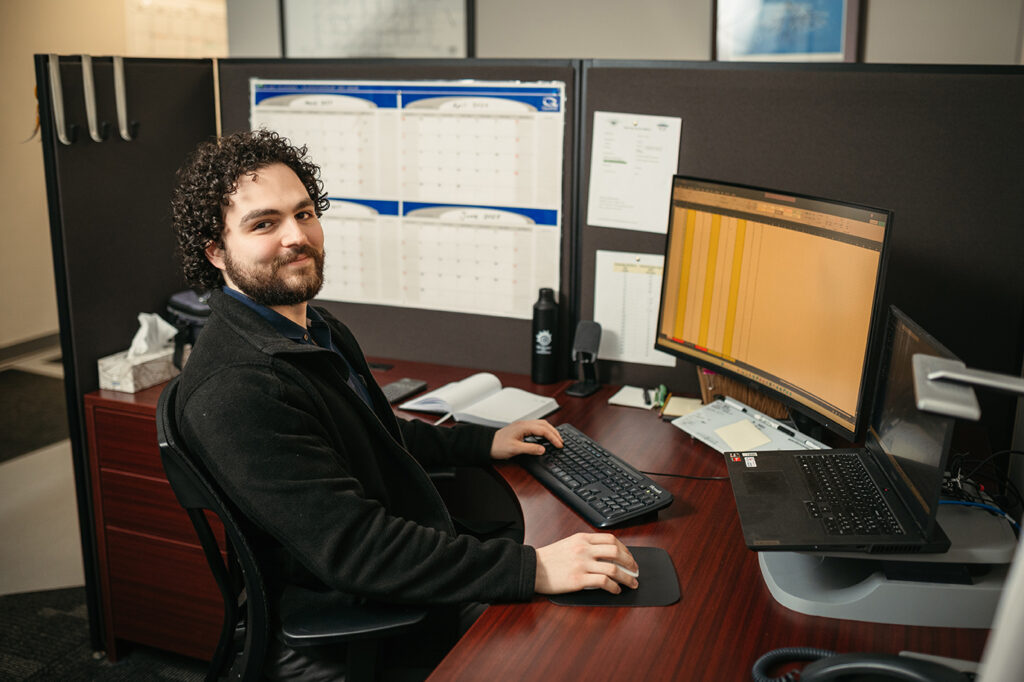
For Aidan Ritchie-Dickinson, Civil Engineering isn’t just about what you build—it’s about the impact you make.
As a student at Mac Eng, he spent time volunteering as a Civil Engineering Ambassador, attending events and providing advice to future students. He also played a key role in shaping the program, advocating for more hands-on design work, industry software training and opportunities for real-world applications.
Seeing some of those changes implemented in Introduction to Civil Engineering (CIVENG 2X03) was a full-circle moment. When he returned to Mac as a guest speaker for Lydell Wiebe’s class, Aidan shared his journey with students eager to follow in his footsteps.
“It was surreal being on the other side,” he said. “I felt proud to share my experiences and see the class so engaged.”
Now as a Civil Engineering Associate at First Nations Engineering Services Ltd. Aidan focuses on critical infrastructure projects, including improving access to clean drinking water for First Nations communities across Ontario.
“Engineering is always about making people’s lives easier, but this work is especially meaningful to me as an Indigenous person,” he shares. “Seeing the real impact on communities I’m connected with is incredibly rewarding.”
Here’s our Q&A with Aidan:
Why did you choose this career path?
I work primarily in the field of water treatment, but also on numerous studies relating to infrastructure development, planning and project feasibility. I was drawn to this work because of the real-world impact it has on communities. During my studies, I became interested in being able to use my engineering degree in a meaningful way, and how essential services like clean water are often taken for granted. I enjoy my job because I use technical problem-solving to create meaningful, real-world solutions.

Can you elaborate on what you do and the impact you’ve made on Indigenous communities?
Many Indigenous communities throughout the country and province face challenges related to water access and quality, so as an Indigenous person myself, being able to provide my skills and qualifications towards these essential community needs feels incredibly meaningful. We are a 100% Indigenous-owned company located on reserve and take pride that we are “First Nation People servicing First Nation People.”
What is the most important thing you learned during your job search?
I learned that networking is crucial. I received a couple of scholarships in my first year, and I made an effort to reach out to the donors. One of them, an engineering-related scholarship, connected me with an engineering firm. Through staying in touch, they helped me apply for co-op positions, and the co-op I landed eventually became my full-time job.
How did participating in extracurriculars support your Mac Eng journey?
I participated in almost everything the faculty and the Engineering Society put on. I loved the sense of community and the shared passion for engineering. Welcome Week was a great experience. By the end of the week, I felt really comfortable and excited to be part of Mac Eng. I was also an Ambassador for the Civil Engineering faculty for more than three years. I attended events and informed future students about our program and provided advice.
What impact did co-op have on your academic journey?
My co-op experience was transformative. I worked for a year and gained real-world applications of what we learned in class. It helped me shift my mindset from just studying for exams to thinking about how to apply concepts in a professional setting. Doing my co-op early, between my second and third year, made me more engaged in my courses afterward, as I could see how the knowledge connected to the workplace.

If you could tell your first-year self one thing, what would it be?
I would tell myself to focus more on school-life balance. I was overly concerned about staying on a strict academic path, trying to finish in four years like high school. Later, I realized that everyone’s journey is different—some take extra years, some do co-ops, some don’t. If I had known that earlier, I would have been more relaxed and open to different paths.
If you could give advice to your just-graduated self, what would it be?
It hasn’t been that long since I graduated—about a year and a half—but I would remind myself that transitions take time. Moving from school to work life is a big adjustment, and it’s important to be patient with yourself and continue learning outside the classroom.
Alumni Blueprints is a Q&A series that highlights the journeys of exceptional McMaster Engineering alumni. Discover how they built their careers, from joining student clubs and teams to seizing co-op opportunities that ignited their passions during their undergraduate years. Our alumni share their unique stories and insights, offering a blueprint for success in their respective fields. Want to share your blueprint for success? Contact the Alumni Team at engalum@mcmaster.ca.
